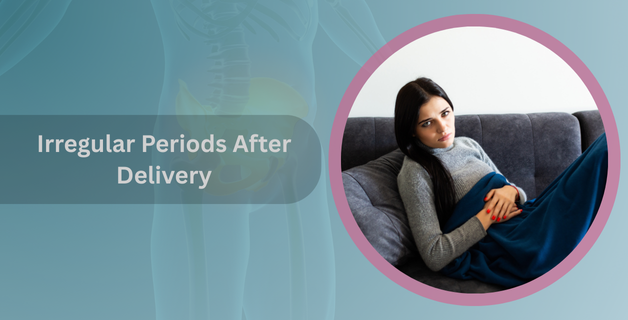After having a baby, your body goes through a lot—physically, mentally, and emotionally. One thing many new moms notice is that their periods don’t behave the way they used to. Some women get their period early, while others don’t see it for months. And for many, the first few cycles feel completely unpredictable.
If you’re experiencing this, you aren’t alone—irregular periods after delivery are extremely common. Most mothers find their cycles take time to settle simply because the body is healing and adjusting to a new routine. And whenever something feels unusual, checking in with a gynecologist can help you understand what’s normal for your recovery.
Why Periods Become Irregular After Delivery
Pregnancy hormones stay in your system for a while, and your body needs time to settle into its new normal. A few things usually contribute:
Breastfeeding: When you breastfeed, your body produces prolactin. This hormone supports milk production but also delays ovulation, which is why many mothers don’t get regular periods right away.
Shifting hormones: Even after childbirth, your hormone levels don’t instantly bounce back. It’s a slow, gradual process, and during this transition your cycle can feel unpredictable.
Newborn routine: Sleepless nights, constant feeding, and adapting to a whole new lifestyle can put stress on your body. And stress alone is enough to delay or disturb periods.
Weight changes: Many moms experience weight loss or gain after delivery, and any major change in weight can influence cycle regularity.
Feeling unsure whether your irregular periods are normal? Speak to a gynecologist today to understand what your body is going through and get guidance that truly supports your recovery.
When Will Your Periods Return?

There isn’t a fixed timeline for when your period should return — every mother’s body works at its own pace. Whether you’ve had a normal delivery or a C-section, the timing varies for everyone.
If you’re exclusively breastfeeding, your periods may stay away for several months.
If you’re partially breastfeeding or not breastfeeding, your cycle may return earlier, sometimes within 2–3 months.
When your periods do show up, don’t be surprised if they feel different. Some women have heavier bleeding, some have lighter flow, and some notice more cramping or longer gaps between cycles. This is usually just your body finding its rhythm again.
For many women, the first few periods feel “out of sync” but gradually settle as hormones balance out. It helps to remember that your body has been through a major transformation—healing takes patience.
But if something feels off — like extremely heavy bleeding or intense pain — it’s always better to get it checked.
Not sure whether your postpartum cycle changes are normal? Book a consultation with a women’s health specialist and get the clarity and confidence you deserve.
How to Manage Irregular Periods Naturally
There’s no instant cure, but a few everyday habits can support your body’s recovery:
- Drink plenty of water
- Include leafy greens, nuts, fruits, and iron-rich foods
- Try to rest whenever you can (even short naps help)
- Start gentle walks or stretching once your doctor approves
- Practise deep breathing or quiet moments to reduce stress
- Note your cycle changes so you can discuss them with your doctor if needed
These small changes, done consistently, can make a noticeable difference. Many new moms are surprised at how much better they feel once they slow down, nourish themselves, and give their body the care it truly deserves.
Flaxseeds provide lignans, which are phytoestrogens that may help balance oestrogen levels naturally. Ground flaxseeds are more easily absorbed than whole seeds.
Limit processed foods high in refined sugars and trans fats. These create blood sugar spikes that stress the endocrine system and promote hormonal imbalances.
Maintain proper hydration with filtered water. Adequate fluid intake supports kidney function and helps eliminate hormone metabolites.
Consider reducing caffeine intake, particularly in the afternoon. Excessive caffeine can elevate cortisol and disrupt sleep patterns that are crucial for hormone regulation.
The gut microbiome influences hormone metabolism. Include fermented foods like yoghurt, kefir, and sauerkraut to support beneficial bacteria.
Conclusion
Irregular periods after delivery are a normal part of the postpartum journey. Your body is healing, adjusting to breastfeeding, and settling into its new hormonal rhythm. Most women see their cycles become regular again over time.
Still, if you ever feel confused or worried, don’t hesitate to reach out for help — reassurance from a specialist can make this phase much easier and give you confidence as you move through recovery.

